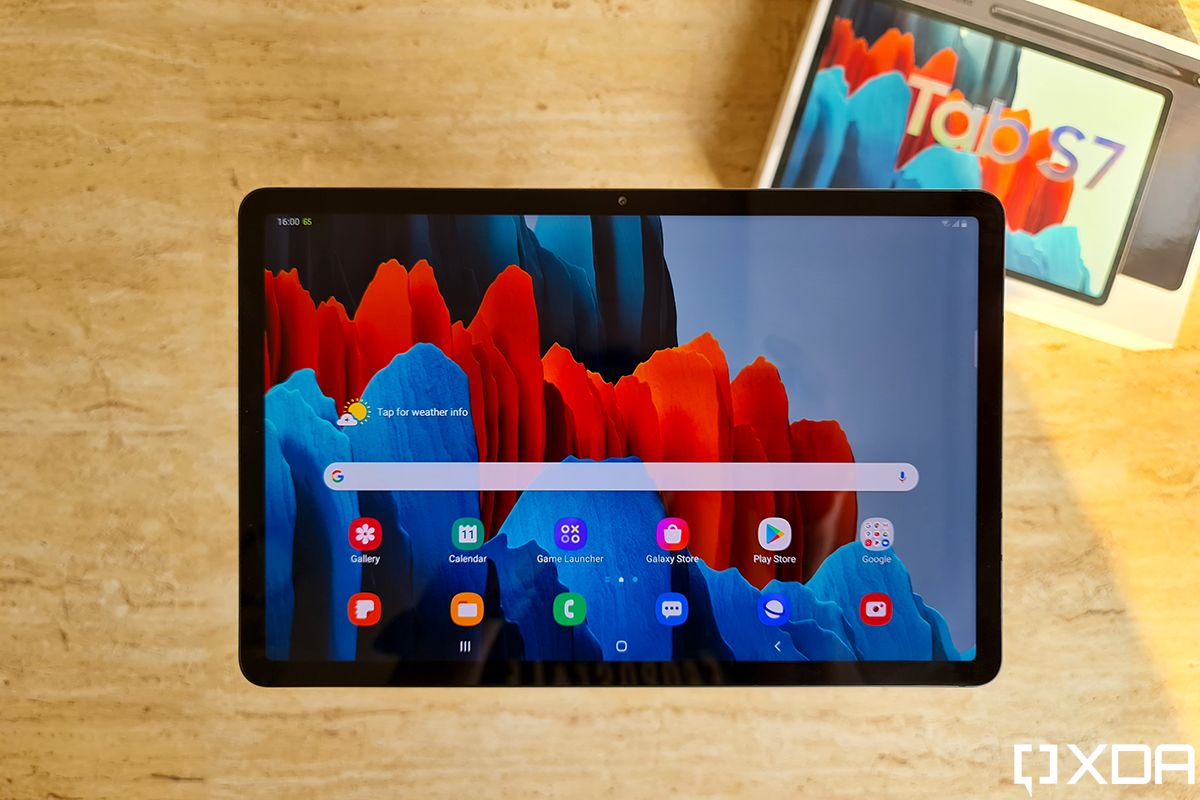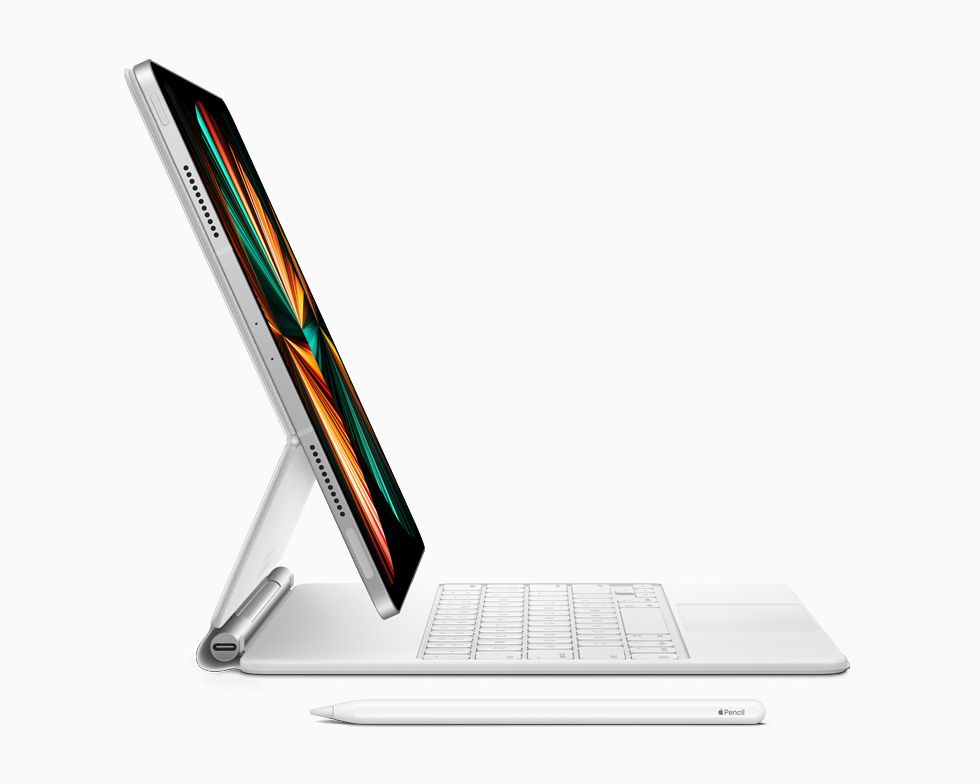iPad Pro 2021 vs Galaxy Tab S7: Battle of the Apple and Android tablets
Ask someone on the street to name a tablet and chances are they’ll mention the iPad. While many Android phone brands from Google to Huawei to Xiaomi have attempted to make their own flagship tablets, only Samsung has the combination of brand power, global availability, technological resources, and marketing muscle to really compete against Apple. So for better or for worse, Samsung’s phones and tablets are often the representative Android product. So, with Apple’s newest iPad Pro just hitting the market, we decided to put it up against Samsung’s most recent tablet.
Yes, we know this isn’t the most direct comparison, since we have the highest tier/larger iPad Pro going against the lower tier/smaller Galaxy Tab S7, but these are the two models I have in my possession currently. I did thoroughly test the larger Galaxy Tab S7+ a few months ago. So even if I don’t have a unit here in-hand now, I am still writing about it from personal experience.

Apple’s 12.9-inch, 2021 iPad Pro and an 11-inch Samsung Galaxy Tab S7, released in late 2020.
iPad Pro 2021 (12.9-inch) & Samsung Galaxy Tab S7 (11-inch): Specifications
| Specification | iPad Pro (12.9-inch, 2021) | Galaxy Tab S7 (11-inch) |
|---|---|---|
| Build |
|
|
| Dimensions & Weight |
|
|
| Display |
|
|
| SoC | Apple M1 | Snapdragon 865 |
| RAM & Storage |
|
|
| Battery & Charging |
|
|
| Security | Face ID | Capacitive fingerprint scanner |
| Rear Cameras |
|
|
| Front Camera | 12 MP, ultra-wide | 8MP |
| Port | USB-C | USB-C |
| Audio |
|
|
| Connectivity |
|
|
| Software | iOS 14.5 | One UI 2.5 based on Android 10 |
| Other Features |
|
|
iPad Pro 2021 (12.9-inch) vs Galaxy Tab S7/S7+: Display
On paper, the 12.9 inch iPad Pro only has an extra 1.9 inches diagonally over the Galaxy Tab S7’s screen. But in real-life usage, it feels way more than that, because Apple’s tablet uses a 3:2 aspect ratio while Samsung chose to go with a wide-screen 16:10 aspect ratio. Even the larger Galaxy Tab S7+’s 12.4 inch screen felt a bit tight for writing work due to the lack of vertical space, so the 11 inch here on the Tab S7 feels quite restrictive. Conversely, the Tab S7 series’s wider aspect ratio is better suited for most videos, with much less letterboxing.

12.9-inch iPad Pro (left) and an 11-inch Galaxy Tab S7.
Other than the aspect ratio, both screens sport a fluid 120Hz refresh rate and each looks great. If we’re comparing just the new 12.9-inch iPad Pro 2021 vs the small Galaxy Tab S7, then Apple’s tablet clearly wins because its Mini LED technology is superior to the IPS LCD panel used in the Tab S7. However, the larger Samsung tablet upgrades to an OLED panel, and the gap closes significantly. Generally, I find the Galaxy Tab S7+’s OLED panel to display deeper blacks and punchier reds, but the 2021 iPad Pro with the Mini LED screen just gets so much brighter.

The larger 12.4-inch Galaxy Tab S7+ (right) next to the 2020 iPad Pro (left).
iPad Pro 2021 (12.9-inch) vs Galaxy Tab S7/S7+: Internals
Both models of the 2021 iPad Pro are powered by the new Apple M1 silicon, while the Galaxy Tab S7 series uses the Qualcomm Snapdragon 865. In an absolute rarity, the Apple product packs more RAM than the Android one, as the 12.9-inch model iPad Pro comes with either 8GB or 16GB of RAM while the Tab S7 series offer either 6GB or 8GB.
If we’re going by benchmarks, it’s not even a contest, as the M1 trumps the Snapdragon 865 in every metric, including more than doubling the multi-core scores in Geekbench 5. However, in real world usage, the gap in power is more nuanced, because the Galaxy Tab S7 basically behaves like a supersized Samsung phone, and Samsung’s One UI is well optimized.

Geekbench 5 scores for the Galaxy Tab S7 (left); iPad Air 2020 (middle); and iPad Pro 2021 (right).
iPad Pro 2021 (12.9-inch) vs Galaxy Tab S7/S7+: Cameras
The iPad Pro’s triple lens main camera system features a 12MP main camera, 10MP ultra-wide, and a LIDAR (light detection and ranging) sensor, while Samsung’s main system contains just a 13MP main and 5MP ultra-wide. Around the front, the Galaxy Tab S7 series uses an 8MP standard selfie camera while the iPad Pro’s front-facing optics include a 12MP ultra-wide lens along with the TrueDepth camera system (all the sensors required for Face ID).
To be honest, neither of these camera systems are amazing if compared to flagship smartphones, and I don’t want to be one of those people who takes photos with a tablet in public anyway. Jokes aside, if I must compare, I find the Galaxy Tab S7’s main camera to produce a livelier image than the iPad Pro’s main camera, but then the other lenses fall far short of Apple’s counterpart. In particular, the Tab S7’s 5MP ultra-wide sensor produces photos at the level of a $200 Android phone, and as is usual with Samsung devices, selfies apply a heavy beautifying effect that make my skin look unnaturally smoothened and whitened.






The iPad Pro’s additional LIDAR scanner also comes in handy for augmented reality apps like measuring the dimensions of furniture, etc.
iPad Pro 2021 (12.9-inch) vs Galaxy Tab S7/S7+: Software
The iPad Pro runs iPadOS 14.5 while the Galaxy Tab S7 runs One UI 2.5 over Android 10. These are essentially tweaked versions of each company’s smartphone software. iPadOS behaves almost exactly like an iPhone, except it has the ability to run two apps simultaneously in split-screen mode (and a third app hovering just off-screen ready to be pulled in at anytime).
Using these devices as a tablet without the keyboard accessory, I prefer the experience on the iPad because iOS mobile apps are more optimized on a large screen than Android tablets; and there’s a far larger selection of apps developed exclusively for the iPad than for Android tablets.
But use the tablets for productivity work, and Samsung’s software is much more versatile. By default it behaves like a blown-up version of a Samsung phone, but One UI 2.5 includes “DeX mode,” which turns the software into a desktop computer style UI with a start menu and task bar at the bottom of the screen, and apps opening in smaller, resizable windows that can be freely placed anywhere on the screen.

This makes the Galaxy Tab S7 series more versatile, and more natural for those jumping over from a laptop looking to get some work done. However, because DeX is just a fork of Android, this means not all apps are optimized for DeX. Google Docs, for example, behaves weirdly in Google DeX — each new document is opened in a separate window instead of within the original app. Other apps like Spotify still open the smartphone layout even in DeX mode.

Opening three apps in smaller resizable windows while the iPad Pro must open apps in split-screen mode.
I also find the 11-inch canvas too small to open more than two apps at the same time, so the advantage of possibly having three or four apps opened at once is mostly for show on the smaller 11-incher. On the larger Galaxy Tab S7+ however, I can run three apps at once and work without as many issues. Still, Samsung giving users the option to go with a more traditional desktop computer UI is great — iPads still feel a bit too draconian in what it allows or doesn’t allow us to do.
iPad Pro 2021 (12.9-inch) vs Galaxy Tab S7/S7+: Keyboard Folio and Stylus
Both the iPad Pro and Galaxy Tab S7’s keyboard case are separate purchases, but the Galaxy Tab S7 series includes its stylus, the S-Pen, free of charge, while the iPad Pro’s Apple Pencil companion is a separate purchase. On top of that, while both brands’ official first party keyboards are overpriced, Samsung’s asking price of $200 or $250 (for smaller or larger model) is still a lot easier to stomach than Apple’s $300 or $350.


To be fair, Apple’s Magic Keyboard has outstanding build quality — Samsung’s keyboard case feels flimsy by comparison — and the Magic Keyboard even features a clever “floating” design that props up the iPad Pro ever so slightly off the table for better ergonomics. But then Samsung’s use of a kickstand allows for a much wider selection of viewing angles than the Magic Keyboard.


In terms of performance, I am quite happy with both. Both keyboards are very good considering their thin profiles, but Apple’s trackpad is more precise and less prone to accidental taps than Samsung’s trackpad.
As for the stylus, it’s no contest — the Apple Pencil supports more levels of pressure recognition and iPadOS has far more apps to take advantage of the stylus than Android. Latency between stylus movement and on-screen response is slightly more noticeable on Samsung’s tablet than Apple’s tablet. But considering that the S-Pen is free and the Apple Pencil costs another $130, perhaps it’s not a fair comparison. For most people, the S-Pen will get the job done.


It’s also worth noting that the Tab S7 has a better way to house the S-Pen: it’s magnetically attached to the device’s back, and then covered by the folio case’s flap. On the iPad Pro, the Apple Pencil magnetically attaches to the side/top of the device and is unprotected. Samsung’s method keeps the stylus much more secure. I’ve dropped the Apple Pencil in public while pulling the iPad in and out of my bag several times.

iPad Pro 2021 (12.9-inch) vs Galaxy Tab S7/S7+: Conclusion
Both the 12.9-inch iPad Pro 2021 and Galaxy Tab S7 series are excellent tablets. While the iPad is more powerful and has a better screen aspect ratio for work, the Galaxy Tab S7 has a more cohesive filing system that behaves more like a regular computer.

Ultimately it really comes down to ecosystem choice. If you use an iPhone or own a Mac, you’ll benefit greatly from having an iPad as a companion. Conversely, Samsung is working to build connectivity between its phones and tablets too — but in terms of overall cohesiveness, it’s still a bit behind what Apple has achieved.
- The Galaxy Tab S7+ features an OLED screen compared to the LCD panel on its smaller sibling. Otherwise you're getting the same great experience.
If you want to save money, the Galaxy Tab S7 or the larger Galaxy Tab S7+ is almost certainly the better value, but the iPad Pro has better app support and a higher potential to do real creative work. If you’re picking up the iPad, we have a few recommendations on great cases for the 12.9-inch iPad Pro 2021.
- The 11-inch model of the iPad Pro may not have that Mini LED screen, but it still has the game-changing M1 processor and comes in a highly portable size.
- The screen on this 12.9-inch iPad Pro has to be seen to be believed. Add the M1 chip and this is almost too powerful for just an iPad.
- If you want to use the iPad Pro to its full potential you will need a keyboard, and Apple's official Magic Keyboard has the best typing and trackpad experience on a relatively thin folio case.
The post iPad Pro 2021 vs Galaxy Tab S7: Battle of the Apple and Android tablets appeared first on xda-developers.
from xda-developers https://ift.tt/341Y1Tt
via IFTTT





No comments: